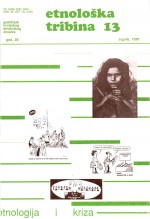Kriza i svakodnevni život - na primeru Beograda
Crisis and Everyday Life - the Case of Belgrade
Author(s): Mirjana Prošić-DvornićSubject(s): Politics and society, Cultural Anthropology / Ethnology, Post-War period (1950 - 1989), History of Communism, Socio-Economic Research
Published by: Hrvatsko etnološko društvo
Keywords: crisis; everyday life; Belgrade; Yugoslav society; economic sphere;
Summary/Abstract: From the beginning of the 1980s the crisis in Yugoslav society (or societies), indication of which had already been diagnosed and warned against a couple of decades earlier by the official circles, began to acquire, constantly becoming more and more evident, intensive, and pervasive, penetrating gradually into all spheres of life - social, economic, administrative, political, ideological, national - dramatic proportions of a »total social phenomenon«. In time it became evident that the society was not facing any isolated, transient or iterative crisis, a functional disorder, that could be successfully resolved thus enabling the existing system to survive and continue to reproduce itself, but, on the contrary, the one that affected the very underlying postulates and values of the society, causing disintegration of the pre-existing structures and subsequent emergence of the new organizing principles and different trends of development Such processes of transition, charged with contradictions and conflicts, which may also be regarded as an ambiguous liminal phase in a social drama, as an in-between period in which important decisions have to be made and acts of remedy initiated, inevitably affect the everyday life of each and every individual involved, forcing him/her to adjust to the new circumstances. The total crisis of the system expressed itself first of all in the economic sphere: considerable increase in costs and drastic decrease of standard of living, restrictions of consumption, especially of energy (electricity, gasoline) and some provisions (oil, sugar, coffee, detergent..), stagnation. The official level of the society tried to resolve the situation by ideological means and mobilize people to unanimously and obediently accept the decision of the leading strata and fight the »evil fore«« that were threatening the »socialist way to the fulfilling future«. The people, however, restored to their own ways of solving the problems and manipulating the system relying more and more on alternative, traditional social (family, kin, affines, friends, compatriots) and economic substructures (black market, privileged positions and access to resources etc.) These alternative ways, described in this paper, have on the one hand prolonged the illusion, at least among some layers, that there could always be found adequate means to cope with any kind of situation, while on the other, they clearly demonstrated how great the discrepancy between the proclaimed and the realized had become. As the crisis became more and more pervasive, towards the end of the decade, the crucial point of final decision making in the liminal transitional period was reached: are the old values to be restored, or are the new ones to be accepted? The choice will soon be known.
Journal: Etnološka tribina : Godišnjak Hrvatskog etnološkog društva
- Issue Year: 20/1990
- Issue No: 13
- Page Range: 47-61
- Page Count: 15
- Language: Serbian

